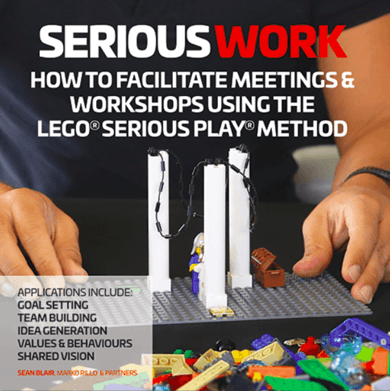LEGO Serious Play Impact in Business World
- This topic has 10 replies, 8 voices, and was last updated 6 years, 6 months ago by
 Michael Fearne.
Michael Fearne.
-
AuthorPosts
-
December 18, 2018 at 10:23 pm #12493
 Marko RilloKeymaster
Marko RilloKeymasterLet us discuss the recent book of Dan Lyons: “Lab Rats: How Silicon Valley Made Work Miserable for the Rest of Us“. He has started with strong statements on LEGO Serious Play methodology suggesting it is on par with “New Age therapies” that are spreading in organizations and making employees more miserable. What is your take on that critique?
December 20, 2018 at 12:00 am #12497 Andrew BatchelorParticipant
Andrew BatchelorParticipantI am a newly certified facilitator, so my experience is limited. He makes several points based on his reading and single morning interaction with a facilitator (who seems to be combining LSP with other things) in an attempt to put LSP in the “silly” category.
– Complains it’s not a serious thing, but balks at the idea of certification. Which do you want it to be? Something anyone can do and therefore not worthy of a second look, or a standardized tool which requires that everyone do it more or less the same way?
– You’re going to get fired if you don’t play with the bricks “right”. If that is the case, then the company is the problem, not LSP, and you likely don’t want to work there anyway.
– Has problems making a duck, but missed the point that whatever you build is whatever you say it is. No one can fail to make a duck. In a session I attended, one participant assembled the six bricks in a random pile and dubbed his creation “roadkill duck”.
– His statement about “the indignity of toys” makes me think that he belongs to the group that got creativity and imagination trained out of them at an early age. And that’s a shame.Andrew
December 20, 2018 at 8:12 am #12498 WernerParticipant
WernerParticipantI have not read the book (yet). I would venture the following statement tho. I work in the design field myself and can only equate the statement to the same that is being said about design thinking.
Design thinking is being touted as the silver bullet for floundering companies desperately trying to ‘innovate’ through canned creativity. The amount of half baked master classes and paper prototype workshops for disgruntled employees is staggering. Design thinking is a beautiful framework and very effective when used as scaffolding but it can’t save the Titanic (the Captain/CEO ignored the market and sailed the ship into the iceberg mate).
I see LSP in the same predicament, let’s throw some bricks on the table and see if we can get our underpaid employees to innovate. The only thing with LSP that I find frustrating, unlinke design thinking for example, is that there seems to be an unwillingness to explicitly share the details of individual sessions and applications and approaches. This forum has been generous and a great resource, but everytime I want to use LSP for sometching I feel like I have to reinvent the wheel or get additional training to see how someone structured a ’workshop’ for alternative applications of LSP.
Thus, as a practice we can’t really critique each other’s work and help new facilitators move beyond their initial certification training toward more complex applications. While the method is open sourced, the application seems to be closed.
I have so many opportunities to use the method but I’m shying away from it due to lack of detailed reference (agile/scrum, design thinking, prototyping, business model, value proposition). For those not shying away from applying LSP for these challenges how do we know if they are doing a good job?
We are regulating who is ‘certified’ but not growing the application of the methods. Thus, the author might have a point unless you assume that everyone certified/uncertified out there is doing a sterling job.
December 20, 2018 at 9:40 am #12499 Eli De FriendMember
Eli De FriendMemberHi Werner, I hope you managed to get yourself included in the Slack Channel as per your request some weeks back.
I feel compelled to respond to your post on the Impact in the Business World, because you make some very valid points, but also some erroneous assumptions or perhaps misinterpretations.
When someone asks to have a script for running a workshop, the following thought process almost invariably runs through my mind:
1) The facilitator has proven they can design a workshop roadmap. Otherwise they wouldn’t be certified. So why are they asking on this forum, rather than just getting down and doing it?2) Anyway, even if they do get a script from another facilitator in the same language, who is to say that the script for one facilitator with his/her own personal sense of humour and presentation skills for a particular client with a specific corporate culture in a specific business context, with the specific individuals in the workshop, is necessarily going to work for a different facilitator with the same group on a different day, let alone with a different client and business context, etc.
– the new facilitator is still going to need to tailor the roadmap to his/her client’s specific requirements.3) Even if I happen to have a nicely packaged roadmap ready to share with others, what happened to the business model that was the justification for making LSP Open Source? The whole idea was that we should be able to establish a market to sell our Intellectual Property to our LSP-facilitator colleagues. I can sell my presence to a client, but the client isn’t prepared to pay for the days I spend crafting a powerful and impactful roadmap, with supporting material. On the other hand, I should be able to monetise that investment by offering it to other facilitators.
Did that work? No! Why not? I can only guess. Perhaps every certified LSP facilitator believes they are better than the others and so anyone else’s material would not be worth paying money for. Or perhaps there is the fear/realisation that customisation would still be needed and so you’re going to have to spend time at your desk anyway – might as well do the whole thing and save some money.
I have already made some of my applications available on this site for free. One of them was the business modelling application. Instead of everyone re-using the one we made available, they re-invented their own. Some of them went on to create there own certification training packages for facilitation of workshops using the Business Model Canvas with LSP. I remember at an LSP meeting before the establishment of the seriousplaypro web site, Denise Meyerson shared her whole folder structure with anyone who had a USB stick. Did any of us use it? Probably not! Why not? Well in my case, it was first because I didn’t have a client with those needs and in the intervening time, I have even forgotten what that application was. And in any case, I would prefer to use my own approach rather than Denise’s.
The subject of this discussion is Impact and your mention this in your penultimate paragraph. You assert that you shy away from running an Agile/Scrum or Design/Thinking workshop because of a lack of detailed references. Are you talking about references as in customer testimonials or a previously proven script with which to conduct the workshop? On the second point, well that is the biggest challenge isn’t it. How do we know if our client and has used anything of what we did? What they say to you in an after-workshop debriefing session is one thing. To what extent your workshop or series of workshops actually helped the client organisation address its problems is another. How does Harvard know whether its Executive MBA helps get people better jobs or whether it only selects the people who get better jobs as participants on their Executive MBA programme.
I like to think that I have contributed to
– a more collegial and effective management culture in the world’s most prestigious hotel school
– allowing Swisscom to catch up a 5 year lag behind Orange in human-centred design thinking, overtake it and then watch Orange disappear from the market in Switzerland
– uncovering a management disconnect and improving project management in the R & D division of one of Honeywell’s major businesses.
– improving the way the United Nations supports the development of a community after a disaster
– ensuring that the Airbus A350 was actually sold to airlines
– the decision to reduce fossil fuel subsidies in Indonesia, thereby reducing the green house gasses in a country which is the world’s 4th largest emitter of GHGsBut who will ever know if the LSP workshops were the game changer in any of these interventions?
December 20, 2018 at 3:26 pm #12501 Thierry GregoriusMember
Thierry GregoriusMemberI found this blog post by the author where he specifically rants against LEGO Serious Play:
https://medium.com/s/story/why-have-our-offices-become-like-touchy-feely-kindergartens-cc7629912fb7
Reading this blog post, and Amazon reviews of his book (I’ve not read it), it seems to me that this author takes an approach fairly typical of authors in the business world: he has an already established opinion of a problem to which he then tries to fit anecdotal evidence.
For example, in his blog post he starts with “When I first heard about Lego workshops, I thought someone was pulling my leg.” – so his mind was already made up before he’d even tried it.
One Amazon review says “There is a lot of hyperbole and emotional ranting in this book that is very funny, but at times starts to sound a bit like sour grapes.”
Another Amazon reviewer: “…he is eager to point out the politics of certain CEOs when it benefits his argument, but not when it does not.” (not relating to LEGO)
The author similarly rants again AGILE, which actually works well in many companies, and most IT developers I know prefer it over the traditional waterfall approach. He has problems with the idea of “playing” at work, but I could easily point him towards successes evidenced in books like Lifelong Kindergarten (by Mitchel Resnick) – I suspect he ignores this stuff because it doesn’t fit his argument.
The book may well touch on valid issues in the work place, and be genuninely funny (note the author is also a comedy screen writer) but he seems to rant against LSP merely because it suits his story, as this review also seems to suggest https://www.publishersweekly.com/978-1-4789-9304-9. In his blog post he belittles the science behind LSP, but then offers no science or evidence of to support his side of the argument.
In other words, he’s just another guy with an opinion.
December 20, 2018 at 3:43 pm #12503 Jody LentzParticipant
Jody LentzParticipantWell said, Thierry. This guy is not mature enough to play seriously.
When we first started putting LEGO Serious Play into the market in 2001, it became clear that LSP was NOT for everybody in every organization.
Facilitating LSP workshops with 7500 people since 2001 proves out 100% of the time “you learn more about a person in an hour of play than in a year of conversation.” Although Plato did not actually write this, it is a universal truth – the business value of LSP is deep learning about your team and co-creating many possible correct solutions.December 21, 2018 at 8:17 am #12504 WernerParticipant
WernerParticipantHi Eli. Quick note, keeping it short not to distract from the original topic. I have empathy with your perspective. I also want you to understand that “seriousplaypro.com” is a great resource but literally one of very few that I deem credible – so my comments are not meant as an attack on you. I tip my hat to your experience and I assure you that I have a similar list. However – I still feel that in the world of LSP I remain isolated.
As for SLACK… nope. Never got in.
December 28, 2018 at 6:14 pm #12548 Jamie HutchinsParticipant
Jamie HutchinsParticipantHi All,
It’s my first time in contributing to this forum, but the nature of this discussion certainly jived with my experience of attempting to bring LSP to some of my clients (and potential clients).
I’ve not read the book in question and in fact Amazon is telling me it is currently unavailable, but I think a lot can be taken from the fact that the author is a noted comedy writer, especially focused on Silicon Valley. The book is also described as a “roast”, which isn’t necessarily a tradition common across the world. That being said, one might expect that it was written in a particular manner and looked for easy targets which the general reader might associate with in order to get a laugh. Two or three years ago, before I had any real exposure to LSP (and baring in mind my typically irreverent and sarcastic sense of humor) I might have easily written it off too. I think it’s important that we keep a sense of humor even if we advocate the LSP method.
Now, a year after certification, I have failed to use LSP in any client situation and found many closed minds and closed doors where LSP would (IMHO) be perfect for the group and situation in question. I’ve been pondering on this for some time now since my experience with the LSP certification was quite profound. I have clearly not done a good job of conveying how LSP might be used and the outcomes that a potential client might expect. Equally the potential clients I’ve spoken with form opinions as soon as the word LEGO is mentioned. By contrast, does anyone ever object if you say you will use POST-IT notes as a tool during a workshop?
And here is where I start to form a hypothesis. We all come to any situation with our own biases and opinions, I conjecture that a typical initial client response to LEGO SERIOUS PLAY is an immediate focus on the tool (i.e. LEGO bricks) and perhaps childhood memories of their use, meanwhile missing the word SERIOUS, skip then to PLAY and suddenly an opinion (playing with Lego) that this has no role in “business”. Not everyone will be this way of course, but enough to make it something of an uphill battle. Add into this that often any approach can come from an HR professional, often looking for a fun ice-breaker, rather than an intensive process and methodology with diverse applications, and I think you can appreciate where some of the issues lie.
As professionals, I think it is important that we remain open to criticism and continue to develop and refine a methodology that we know works when it is given the opportunity. From the other descriptions of the book content, it seems like the author, in particular, brought considerable bias to his experience of LSP and that it might not have been particularly representative of good application or facilitation. So how do we respond and combat such opinions? Do we write them off or do we seek to improve our product and generate better evidence of success? I for one would be keen to see more concerted efforts among the LSP community to generate validated research to quantify and qualify some of the positive outcomes the method has to offer in its many applications.
If we could move from the tool brand identity to outcome identity being most prominent in people’s minds that would be a giant step forward. We live in a world where data (and big data) speaks, so perhaps we need to create and share some? Do we really achieve greater participation that others methods? Do participants enjoy and recommend LSP (is there a net promoter score)? Are there standardized measures of success that could be implemeneted from the various applications? etc. etc.
When I have a doubtful response, I typically resort to the scientific base of LSP (my own bias coming from a scientific background), but where is the applied data?
Very interested to see where this discussion could go further.
Thanks
Jamie
January 2, 2019 at 3:32 pm #12580 Thierry GregoriusMember
Thierry GregoriusMemberI think Jamie makes some good points. In my mind there is no doubt about the value of LSP as a method (and I intend to get fully certified as soon as time and budget allows), but if Dan Lyons’ statistics are right — 10,000 certified facilitators vs 100,000 participants, i.e. a ratio of 1:10 — then it would seem that the ROI for getting certified is very low, as on average it would end up being applied to just 10 individuals.
Better data on the successes of LSP would certainly help here – anyone have anything to share?
Failing that, all we can do with potential clients is to leave the methodology out of the conversation until the workshop objectives and requirements have been agreed. Similar to IT consultants pushing solutions before the requirements are clearly defined (something I’m very familiar with), maybe some of us are making the mistake of pushing LSP too soon i.e. focusing on the HOW before agreeing the WHY and WHAT. Once that agreement is in place it should be easier to make the case for LSP if it is presented as one of a range of options, or a preferred option that you recommend for specific reasons.
January 3, 2019 at 8:20 am #12583 Michael FearneMember
Michael FearneMemberGreat discussion in here, thank you everyone.
I wouldn’t put much stock in Dan’s views, numbers or anything else. Clearly has a chip on his shoulder and an agenda to push with his book. I’m not wasting any more breath/words on him.
As to how to talk about LSP and the challenges that some of you are facing in getting clients to use LSP, I’m not surprised.
Think about it for a minute, we’re trying to get business people to do something different, play with LEGO at work and achieve a real business outcome. That sounds ludicrous! It should be difficult to convince people.
We know the method works, but the answer is not about outcomes or scientific evidence or big data. All of those are noble goals, should be pursued and can play a role in the bigger LSP story. But they aren’t the thing that will change your client’s mind.
The key to getting people to use LEGO Serious Play is to get them experiencing LEGO Serious Play.
I’ve had the most success with clients when I’ve run mini sessions with them so they could experience LSP for themselves.
Bring the LEGO to your meetings with clients and run a quick session. Tell them you’ll run a “Lunch and Learn” for their team to test it out. Use the word “pilot” to take the risk out of it.
It’s a lot more work up front to do that but it works surprisingly well.
But there are some people / clients who still won’t want to do it. And so I move on to other clients. I have that luxury. There are plenty of other people/clients out there that are innovative and looking for a method to help them.
So if you’re having trouble with LSP and clients there really is only two elements to it. Either the way you’re talking about it or the clients you have. Both are under your control and changeable.
Don’t wait for the “research” train to come in. I know work is happening and I’ll be happy when it arrives, but in the meantime I want to run LSP sessions and help people.
-
AuthorPosts
- You must be logged in to reply to this topic.

 Become a LEGO Serious Play facilitator - check one of the upcoming training events!
Become a LEGO Serious Play facilitator - check one of the upcoming training events!